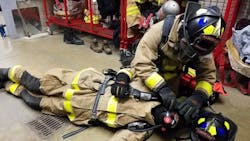Addressing Volunteer Decline Through Consulting
We’ve all seen the statistics that fire and emergency medical services are in trouble. Departments that once had able-bodied volunteers and job applicants lining up on a waiting list are in dire need of recruits. Fewer people are interested in being a first responder, and many applicants are not able to meet the minimum requirements. This at a time when the training requirements are getting higher because fires are burning are faster and hotter due to building construction and synthetic materials, and an increasingly aging population is only going to generate more medical calls.
Departments have been looking at ways to attract qualified applicants and often must grapple with the question of having to lower the standards to fill the rosters. Instead of applicants coming to the departments and asking about what it takes to join, departments are having to market themselves to the community as they try to attract members. And that creates some interesting challenges and dynamics.
This is also at a time when more employers are stingy about allowing their employees to leave for calls, which is not completely unreasonable. While we as firefighters and medical responders may be able to communicate value that we can bring to an employer, the fire service has traditionally been shy about communicating the value we bring to our employers and communities through our training and experience.
We often have the training to quickly respond to fires and medical emergencies in the workplace, fill the incident command role during workplace emergencies that larger employers need, have leadership experience, can remain calm during stressful situations, and much more. Some departments also frown upon their volunteers taking their training and profiting on it, which I feel is unreasonable, as communities lose nothing when the volunteers they train use that knowledge in other places, and most volunteers bring training and experiences from their outside lives to their departments.
What if the answer had to do with changing the value that the training brings to the volunteers and shifting the perspective that first responders should be fully able to profit from their experiences? Obviously, there are constraints that they may not use confidential information, not touting their position with a department, or not using pictures of themselves in uniform, for example. However, there should be no reason why a volunteer firefighter should feel reluctant to use their training and experience to further their career.
Over the past several years of my career as an industrial safety professional, my fire and medical training have helped me substantially, particularly as I started a consulting firm. As a safety professional, it has been much easier for me to quantify the benefits of missing work for fire training and call response because the benefits are much more relatable to an employer, as topics like confined space, rescue, atmospheric monitoring, fall protection, hazmat, and other topics go hand-in-hand between industry and the fire service. And as a firefighter, I bring an intimate knowledge of those same topics as they relate to daily usage and what firefighters will find in industry rather than simply learning about them from an emergency response perspective.
As a consultant, I saw the need to bring other first responders into my firm to share their knowledge with industry, for which there is a definite need. Police officers train industry for active shooter and workplace violence incidents and prevention, and train supervisors for drug and alcohol impairment recognition. A commercial vehicle inspector trains companies with DOT compliance requirements. An EMT teaches first aid and CPR. The relationship between industry and first responders is very natural, and it gives first responders the ability to make more income. I can also send them to training that helps them be better consultants, and they bring that experience back to their departments to be better first responders. So, the relationship is very symbiotic.
When starting out along this route, I could see the unease in both officers and the first responders I was speaking with because of the perspective that first responders should not gain financially from their training and experience, but what if this is one avenue we have to take to draw more first responders into our ranks? While there is some potential for abuse, I believe most people that want to learn a skill and teach it become better first responders. And the market will weed out the ones that only want training to profit from it or over-market themselves as super-firefighters, as their credibility quickly wanes, much like the firefighters who only want the T-shirt quickly fizzle out and stop attending training.
By seeking out industries and job positions that would directly benefit from training as a first responder, we may have one more tool in our toolbox to make the fire and emergency medical services better. It may not sit well with tradition, but this is one avenue where tradition may be hindering rather than helping us, as departments, as volunteers, in industry, and in our communities.
After all, if a tradition is keeping qualified members out and causing losses of homes and lives, isn’t it time to reevaluate it?
About the Author
Brad Kramer
Brad Kramer is a firefighter/EMR/instructor for Albert Lea Fire Rescue and owner of Provenio Consulting, a safety and environmental consulting firm. He lives in Albert Lea, MN with his wife, three kids and dog.
